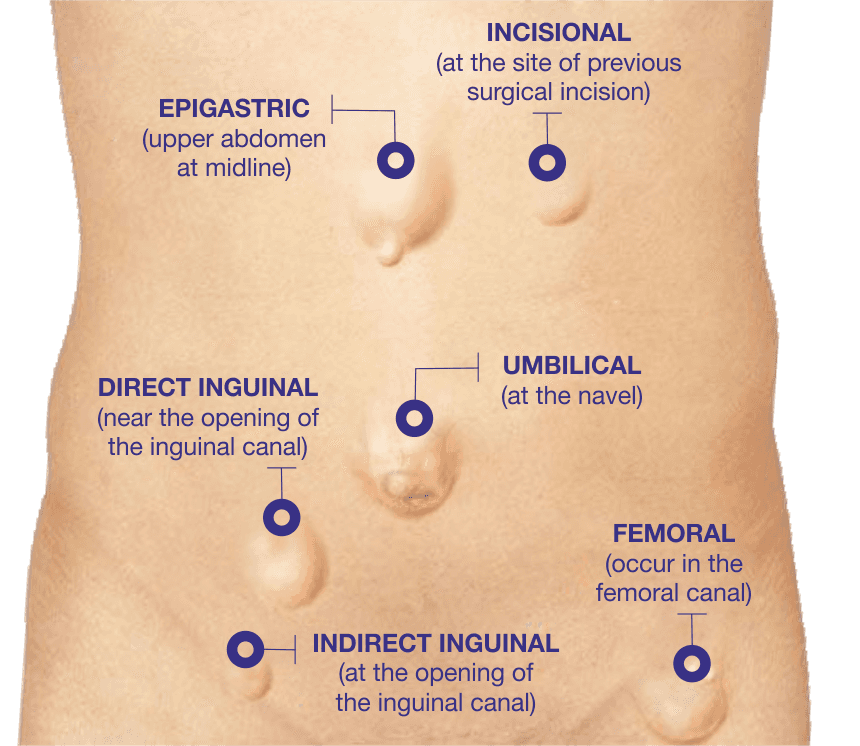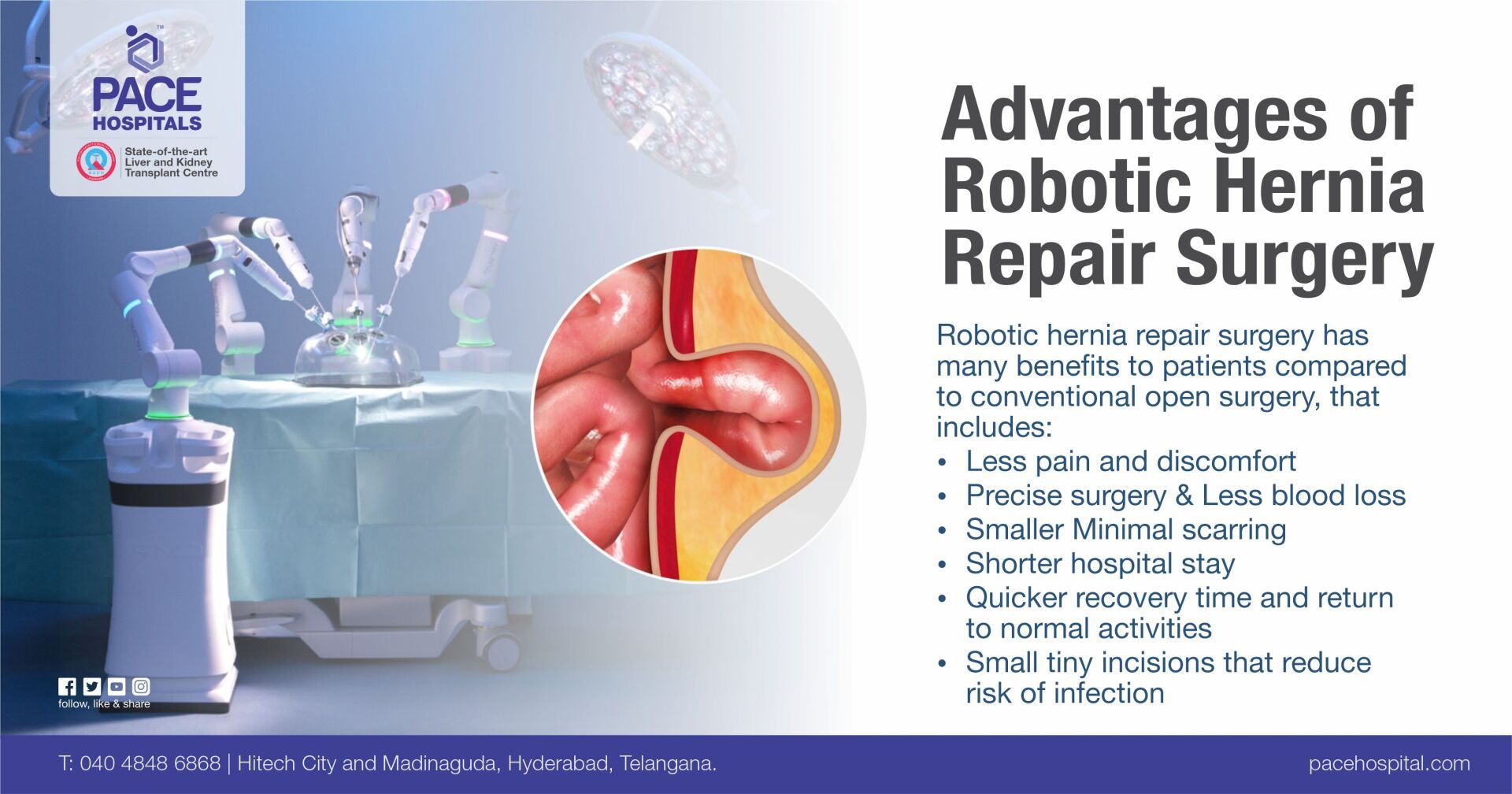Hernia Surgery in Hyderabad - Cost, Success Rate & Benefits
PACE Hospitals is widely regarded as the Best Hospital for Hernia Treatment in Hyderabad, India, offering a wide range of hernia repair procedures performed by highly skilled and experienced hernia surgeons. With a focus on minimally invasive techniques, PACE Hospitals utilizes the latest 3D HD laparoscopic and robotic technology to ensure the best possible outcomes for patients. From the initial consultation to post-operative care, PACE Hospitals is committed to providing personalized and comprehensive evidence based safe & effective treatment for all types of hernias.
Book an appointment
Hernia Treatment Appointment

Common Types of Hernia and its causes
A hernia is a bulge caused by an internal organ or other body part pushing through the wall of muscle that's holding it in. Most hernias happen within the abdominal area between the hips and the chest.
These are the most common 6 types of hernia:
Inguinal hernia
An inguinal hernia occurs when a small portion of the bowel bulges out through the inguinal canal-a passage or opening through the muscles of the abdominal (belly) wall-into the groin. The bulge usually contains tissue lining the inside of the abdomen as well as fatty tissue from inside the abdomen. Or it may contain a loop of intestine. There are two types of inguinal hernias: Direct and Indirect.
Femoral hernia
A femoral hernia occurs when tissue bulges from the lower belly into the upper thigh, just below the groin crease. Femoral hernias occur more often in women than in men. Pain from a femoral hernia is usually felt in the groin area. It is sometimes mistaken for an inguinal hernia. A femoral hernia can be hard to diagnose.
Umbilical hernia
An umbilical hernia occurs when intestine, fat, or fluid pushes through a weak spot in the belly. This causes a bulge near the belly button, or navel. Umbilical hernias can also occur in people who have health problems that create pressure in the belly, such as being overweight, being pregnant, or having too much fluid in the belly.
Incisional hernia
An incisional hernia can occur after surgery in the belly. It can happen months or even years after surgery. Most of the time, it occurs along a vertical (up and down) incision. This type of hernia can occur in people who: Are very overweight, are older, have used steroid medicines, have had lung problems after surgery, have had a wound infection after surgery or have had more than one surgery using the same incision.
Epigastric hernia
Epigastric hernias are lumps or bulges that occur in the upper part of the abdominal wall - in an area known as the epigastrium, which is above the navel and just below the breastbone. Epigastric hernias can be present from birth. They may vary in size, and it is possible to have more than one epigastric hernia at a time.
Typically, an epigastric hernia is small, with only the lining of the abdomen breaking through the surrounding tissue. Larger hernias, however, may cause fatty tissue or part of the stomach to push through.
Hiatal hernia
A hiatal hernia is different from other types of hernias, because it involves the stomach instead of the intestine. It occurs when part of your stomach bulges up through your diaphragm and into your chest. The diaphragm is a sheet of muscle that separates your belly from your chest. You can't feel a hiatal hernia or see a bulge.
Most people with a hiatal hernia have no symptoms. But one symptom you may have is heartburn. If you often have symptoms, or if they are very bad, you may also have gastroesophageal reflux disease (GERD). A hiatal hernia can lead to GERD. It's common to have both problems at the same time.
What is Hernia Surgery?
A hernia repair is a surgical procedure to treat hernias. Hernia repair surgery is the most common surgery performed throughout the world. Generally it takes 1 to 2 years before hernias begin to cause irritation and painful symptoms. These are the two methods of hernia surgeries:
- Hernioplasty (mesh repair): It is a type of hernia repair surgery where a mesh is stitched over the weakened muscle and with the help of mesh muscle grow back over time. Now a days it is a common hernia surgery and have better outcomes for the patients.
- Herniorrhaphy (tissue repair): It is the oldest type of hernia repair surgery and now a days less commonly used.
What are the types of Hernia Surgery?
There are mainly 3 types of hernia surgeries:
- Open hernia repair surgery: In this surgery, the surgeon makes a cut into the body at the location of the hernia and gently pushes the hernia back into place and close the weakened muscle through stitches with or without a mesh.
- Laparoscopic (minimally invasive) hernia repair surgery: In this surgery, a thin and a telescope like instrument called as a laparoscope inserted through a small incision at the abdomen. This generally performed under general anaesthesia. Tiny scar, less pain after the surgery, shorter hospital stay are the main benefits of Laparoscopic hernia repair surgery.
- Robotic hernia repair surgery: It is a kind of advanced laparoscopic surgery where the surgery performed through robotic system that have 3D imaging, tremor filter, and articulated instruments. Improved visualization and greater dexterity are two major features of robotic-assisted laparoscopic surgery provides undoubted technical advantages over conventional laparoscopy.
What is the success rate of hernia surgery?
Hernia surgery boasts a high success rate, typically ranging between 92% and 98% with a low rate of recurrence according to various studies. This translates to a low risk of complications and a significant likelihood of symptom relief.
Several factors can influence the success of hernia surgery, including:
- Hernia Type and Size: The size and complexity of the hernia can impact the surgical outcome.
- Patient Health: Overall patient health and any underlying medical conditions can influence recovery.
- Surgical Approach: Minimally invasive techniques, such as laparoscopic repair or robotic repair, generally demonstrate higher success rates and lower complication risks compared to open surgery.
While successful in most cases, hernia surgery carries inherent risks, such as:
- Infection: A risk with any surgical procedure.
- Bleeding: Minor bleeding is common, but major bleeding is rare.
- Pain: Post-operative pain is expected and can usually be managed with medication.
- Hernia Recurrence: Although uncommon, there's a small chance the hernia may return.
The high success rate, coupled with a low risk of complications and the significant improvement in quality of life it offers, makes hernia surgery a highly effective and widely recommended treatment option for many patients.
What is an inguinal hernia surgery?
Inguinal hernia surgery is a surgical procedure to repair a hernia in the inguinal region, which is the area in the lower abdomen near the groin. An inguinal hernia occurs when a portion of the intestine or fatty tissue protrudes through a weakened area in the lower abdomen near the groin, creating a bulge that can be painful or uncomfortable.
There are mainly two types of inguinal hernia surgery:
- Open Inguinal Hernia Repair: This procedure involves an incision in the groin area, returning the herniated tissue to its proper place, and reinforcing the weakened area with stitches or a synthetic mesh.
- Laparoscopic Inguinal Hernia Repair: This minimally invasive surgical procedure that involves making small incisions in the abdomen. A thin tube with a camera, known as a laparoscope, is inserted through one of the incisions to provide visualization of the hernia. The herniated tissue is then returned to its proper position, and a hernia repair with mesh is performed to strengthen the weakened area in the abdominal wall. Once the repair is complete, the incisions are closed with stitches or surgical glue. This technique typically results in a shorter recovery time and less post-operative pain compared to open hernia repair.
Benefits of Laparoscopic Inguinal Hernia Repair with Mesh:
- Minimally Invasive: Smaller incisions result in less pain and scarring.
- Faster Recovery: Typically leads to a quicker return to normal activities.
- Shorter Hospital Stay: Often allows for same-day discharge.
Laparoscopic inguinal hernia repair with mesh is a common and effective treatment for inguinal hernias. While inguinal hernia repair is generally safe, all surgeries carry inherent risks, including infection, bleeding, and potential damage to surrounding tissues. It's crucial to discuss the risks and benefits of laparoscopic inguinal hernia repair with mesh with a surgical gastroenterologist to determine if it's the right approach for you.
The inguinal hernia surgery cost in Hyderabad, India can range from ₹38,000 to ₹1,20,000 (US$442 to US$1,398) depending on several factors, including the type of the surgery (open, laparoscopic or robotic), the size and location of the hernia, the patient's overall health, the hospital or clinic where the surgery is performed, and the experience and reputation of the surgeon.
What is an umbilical hernia surgery?
Umbilical hernia surgery is a safe and effective surgical procedure to repair an umbilical hernia, which is a type of hernia that occurs when a portion of the intestine or fatty tissue protrudes through a weakened area in the abdominal wall at the belly button, creating a bulge that can be painful or uncomfortable.
There are two main types of umbilical hernia surgery:
- Open umbilical hernia repair: In this procedure, the surgeon makes an incision in the belly button area, pushes the herniated tissue back into the abdominal cavity, and then strengthens the abdominal wall with stitches or a synthetic mesh. The incision is then closed with stitches or staples.
- Laparoscopic umbilical hernia repair with mesh: In this procedure, the surgeon makes several small incisions in the abdomen and inserts a laparoscope, a thin tube with a camera, to visualize the hernia. The herniated tissue is then pushed back into the abdominal cavity, and a synthetic mesh is used to reinforce and strengthen the weakened area in the abdominal wall. The incisions are then closed with stitches or surgical glue.
After the surgery, patients may experience some pain and discomfort, which can be managed with pain medication. It's important to follow the hernia specialist doctors / surgeon's instructions for post-operative care, including restrictions on lifting and strenuous activity, to ensure proper healing and reduce the risk of complications.
The umbilical hernia surgery cost in Hyderabad, India can range from ₹40,000 to ₹1,25,000 (US$467 to US$1,456) depending on several factors, including the type of the surgery (open, laparoscopic or robotic), the size and location of the hernia, the patient's overall health, the hospital or clinic where the surgery is performed, and the experience and reputation of the surgeon.
What is a hiatal hernia surgery?
Hiatal hernia surgery, also known as hiatal hernia repair, is a surgical procedure to repair a hiatal hernia, which is a type of hernia that occurs when a portion of the stomach pushes through an opening in the diaphragm, the muscle separating the chest and abdomen. This can lead to symptoms like heartburn, acid reflux, and difficulty swallowing.
Hiatal hernia surgery is typically performed using a laparoscopic approach, which involves making several small incisions in the abdomen and using specialized instruments to repair the hernia. During the procedure, the surgical gastroenterologist will return the stomach to its proper position in the abdominal cavity, and then repair the opening in the diaphragm with stitches or a synthetic mesh.
In some cases, the surgical gastroenterologist / surgeon may also perform a fundoplication, which is a procedure to strengthen the lower esophageal sphincter, the muscle that controls the opening between the esophagus and stomach. This can help prevent acid reflux and other symptoms of gastroesophageal reflux disease (GERD).
Post surgery, patients may experience some pain and discomfort, which can be managed with pain medication. It's important to follow the surgeon's instructions for post-operative care, including restrictions on lifting and strenuous activity, to ensure proper healing and reduce the risk of complications.
The hiatal hernia surgery cost in Hyderabad, India can range from ₹65,000 to ₹1,80,000 (US$758 to US$2,096) depending on several factors, including the severity of the hernia, the type of the surgery (laparoscopic or robotic), the hospital or clinic where the surgery is performed, the patient's overall health and the experience and reputation of the surgeon.
Can hernia be cured without surgery?
Surgery only can repair a hernia because hernias don't go away on their own. People can delay in surgery sometimes if the hernia is small and doesn’t have any symptoms, doctor may watch for symptoms then decide for surgery.
Hernias tend to get bigger with the time because of the muscle wall weakness and tissues bulges due to that. It’s highly recommended going for surgery to avoid serious condition such as strangulation.
What is the cost of hernia surgery in Hyderabad, Telangana?
On average, the hernia surgery cost in Hyderabad can range from ₹25,000 to ₹1,25,000 (US$290 to US$1,456), while a laparoscopic hernia surgery cost in Hyderabad can range from ₹48,000 to ₹1,40,000 (US$560 to US$1,630). However, it's important to note that the actual cost of the surgery may vary. It's recommended to consult doctor and hospitals for estimates.
The cost of hernia repair in Hyderabad can vary depending on several factors such as the patient's condition and age, type of surgery (open hernia repair, laparoscopic hernia surgery or robotic hernia repair), hospital facility (private / government or trust hospitals), hospital charges (room type & ICU charges), surgeon's expertise, length of stay, the type of anesthesia used (local, regional, or general), insurance or corporate approval, pre- and post-surgery care and any complications involved.
How much does hernia surgery cost in India?
On average, the hernia surgery cost in India can range from ₹35,000 to ₹1,75,000 (US$405 to US$2,038), simultaneously depends upon the patient's age & condition, type of surgery (open hernia surgery, laparoscopic hernia surgery or robotic hernia surgery) and method used, to perform hernia surgery in the hospitals in different cities.
What are the benefits of Robotic Laparoscopic Hernia Repair Surgery?
Robotic laparoscopic hernia repair surgery has many benefits to patients compared to conventional open surgery, that includes:
- Less pain and discomfort
- Precise surgery
- Smaller Minimal scarring
- Shorter hospital stay
- Quicker recovery time and return to normal activities
- Small tiny incisions that reduce risk of infection
- Less blood loss
Our team of Hernia Surgeons and Hernia Doctors in Hyderabad, India
Dr. CH Madhusudhan
Senior Surgical Gastroenterologist, Bariatric and Metabolic Surgeon, GI and HPB Oncologist, Liver Transplant Surgeon
3,28,338
99,825
684
2011
Inguinal Hernia (Groin Hernia) - Post Surgery Recommendations and Inguinal Hernia dos & don'ts explained by Dr. Suresh Kumar S - Surgical Gastroenterologist, Bariatric and Metabolic Surgeon, GI and HPB Oncologist, Liver Transplant Surgeon
Why choose PACE Hospitals?
- A Multi-Super Speciality Hospital.
- NABH, NABL, NBE & NABH - Nursing Excellence accreditation.
- State-of-the-art Liver and Kidney transplant centre.
- Empanelled with all TPAs for smooth cashless benefits.
- Centralized HIMS (Hospital Information System).
- Computerized health records available via website.
- Minimum waiting time for Inpatient and Outpatient.
- Round-the-clock guidance from highly qualified super specialist doctors, surgeons and physicians.
- Standardization of ethical medical care.
- 24X7 Outpatient & Inpatient Pharmacy Services.
- State-of-the-art operation theaters.
- Intensive Care Units (Surgical and Medical) with ISO-9001 accreditation.









